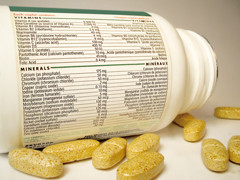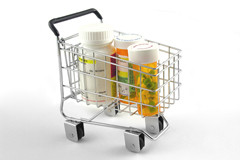
Tips to leverage neuroplasticity to maintain cognitive fitness as you age

Can white noise really help you sleep better?

Celiac disease: Exploring four myths

What is prostatitis and how is it treated?

What is Cushing syndrome?

Exercises to relieve joint pain

Think your child has ADHD? What your pediatrician can do

Foam roller: Could you benefit from this massage tool?

Stepping up activity if winter slowed you down

Common causes of cloudy urine
Harvard Health Blog
Read posts from experts at Harvard Health Publishing covering a variety of health topics and perspectives on medical news.
Articles
Zombie apocalypse? Only in your dreams
It’s Halloween—a time when we’re preoccupied with witches, ghouls, and other frightful creatures. But this year, no creature is generating as much buzz as the zombie. Zombies have inspired movies and TV shows, video games—even a bloody Pride and Prejudice takeoff. Could all this talk of the undead be foreshadowing a real-life zombie apocalypse? In fiction, yes. But not in real life. A Harvard ethnobotanist once found that a neurotoxin was the cause of several cases of zombie-like living deaths in Haiti. Oddly shaped proteins called prions have also been linked to brain diseases that vaguely resemble zombieism. In his novel The Zombie Autopsies, Dr. Steven Schlozman, a zombie enthusiast and professor of psychiatry at Harvard Medical School, imagined an infection scenario that turns normal human beings into flesh-craving monsters. Although a pandemic that creates zombie-like symptoms is theoretically possible, a real-life zombie apocalypse shouldn’t be high up on our list of worries.
Gene mutation key to aspirin’s benefit in people with colorectal cancer
Back in 2009, Dr. Andrew T. Chan and his colleagues at Harvard-affiliated Massachusetts General Hospital found that people diagnosed with colorectal cancer who took aspirin on a regular basis tended to live longer than those who didn’t take aspirin. Aspirin worked only for some people, though, so Chan and a larger team of researchers set out to learn why. Their latest work, published in the New England Journal of Medicine, indicates that people with colorectal cancer who have a mutation in a gene called PIK3CA are most likely to benefit from aspirin. (About 15% to 20% of people with colorectal cancer have this gene mutation.) The mutation permits colon cancer cells to thrive. Aspirin blocks this action. If confirmed, this work could lead to routine genetic testing for people with this common cancer, and aspirin therapy for those with the PIK3CA mutation.
World Stroke Day: Emphasize prevention, early detection
The term “stroke” conjures up a frightening bolt out of the blue. It certainly feels that way when it happens. But the sudden onset hides most strokes’ decades-long development stemming from slow but steady damage to blood vessels, the growth of artery-clogging plaque, or the erratic heart rhythm known as atrial fibrillation. This long gestation means it is often possible to avoid a stroke by fighting arterial corrosion. Today is World Stroke Day—a moment to pay close attention to stroke. Worldwide, this brain-damaging condition afflicts millions of people each year, and kills more than 6 million. In the United States, about 800,000 people have strokes each year, and about 140,000 die from them. There are two main messages of World Stroke Day: Stroke can be prevented. Stroke can be treated if detection and treatment happen quickly.
Metacognitive therapy: a possible new approach for ADHD?
One treatment that can help relieve depression and other mental or emotional problems is cognitive behavioral therapy. It guides individuals to change what they think. A related approach, called metacognitive therapy, helps individuals change how they think. Some preliminary but promising research suggests that metacognitive therapy may be useful for people with attention deficit hyperactivity disorder (ADHD). One study of 88 adults with ADHD found that metacognitive therapy led to significant reduction in ADHD symptoms in 42% of participants, compared to 12% who received supportive therapy. Keep in mind that metacognitive therapy is not yet a proven therapy. More research is needed on its effectiveness in different settings. But that means it doesn’t yet stack up to its elder cousin, cognitive behavioral therapy. And metacognitive therapy can’t be considered as a first line treatment for ADHD.
Surprises from science
Many medical studies confirm what we know or suspect. Every once in a while, though, one surprises us, turning “conventional wisdom” on its head. That just happened with the sudden shutdown of a long-running diabetes trial called Look AHEAD (Action for Health in Diabetes). Begun in 2001 and scheduled to last another two years, Look AHEAD was designed to see if an intensive diet and weight loss program could reduce the number of heart attacks, strokes, and other cardiovascular problems in people with type 2 diabetes. An early peek at the data showed that the program had little apparent effect, and the investigators concluded it would be futile to continue. This does not mean that we should ignore diet and exercise in treating of type 2 diabetes. Instead, the details of the study results, which haven’t yet been published, are likely to reveal other explanations.
Puberty starts earlier in many American boys
Two years ago, new research showed that American girls were hitting puberty at younger ages than ever. The same thing is happening with boys: they are starting puberty almost two years earlier than they did 30 to 40 years ago. Why this is happening isn’t clear, but it could affect social and sexual behaviors. A new study shows that the average age of puberty is now 10 years for white boys (about one-and-a-half years earlier than what has long been considered “normal”), 9 years for African-American boys (about two years earlier than expected), and 10 years for Hispanic boys, which is unchanged from before. Although early puberty is increasingly common, it can be a signal of a tumor in the brain, pituitary glands, or elsewhere; an underactive thyroid gland; or other medical problems.
Late-life depression may signal memory loss or dementia ahead
Depression can strike at any age. Children can develop it, as can octogenarians. No matter when it starts, depression can drain the joy and pleasure from life. The first appearance of depression later in life may also be a signal of memory loss or dementia down the road. According to a study in the Archives of General Psychiatry, dementia is more common among people who become depressed in middle age or later in life than among those who aren’t depressed. Depression is often overlooked in older adults, so it’s important to be on the lookout for warning signs, like feelings of hopelessness, loss of interest in activities, trouble sleeping, and more. It’s important to treat depression in individuals with the beginning of dementia, and older individuals who are depressed should be evaluated for dementia.
Daily multivitamin-multimineral may help protect against cancer
Americans’ love affair with vitamins—more than half of us take one a day—isn’t well supported by science. Trials of single vitamins, like E, C, and beta carotene, have been a bust. Whether multivitamins offer any health benefits has been something of a mystery. Now a new report indicates that taking a standard multivitamin-multimineral pill every day for more than a decade reduces the odds of developing cancer by 8%. The finding comes from the Physicians’ Health Study II, a Harvard-based trial in which nearly 15,000 male physicians took a daily pill containing 31 vitamins and minerals (Centrum Silver) or a placebo. The reduction could be due to fixing micronutrient deficiencies. It’s also possible that low doses of several vitamins and minerals might work together in other ways to prevent cancer. A daily multivitamin-multimineral supplement can provide some nutritional insurance, but it’s no replacement for vegetables, fruits, whole grains, and other healthful foods.
4 tips for preventing neck strain when using a tablet computer
For all too many people, using a tablet computer is a pain in the neck, shoulders, and back. Why? Widely popular tablets like the iPad, Nook, Kindle Fire, and Xoom are so light and easy to handle that you can hold one on your lap or in your hand. That can put you in a position that’s bad for your neck, shoulders, and back. In a study of 15 experienced tablet users, Harvard School of Public Health researchers found that working with a tablet held on the lap or placed flat on a table makes the neck bend much more than does working with a desktop or notebook computer. Neck-wise, the best tablet orientation was having it propped up on a table. Next time you expect to be working with a tablet computer for more than a few minutes, place it on a table and use a case that holds it at a comfortable viewing angle. Shift your hands, your weight, or even stand up when you can. And take a break every 15 minutes.
Lycopene-rich tomatoes linked to lower stroke risk
Succulent tomatoes are far more than just a delicious fruit. Eating them may also help lower your risk of stroke, likely due to the lycopene they contain. Lycopene is a powerful antioxidant that eliminates dangerous free radicals that can damage DNA and other fragile cell structures. Past research has shown that a diet rich in lycopene-containing foods may help lower the risk of prostate and other cancers. Now, in a report just published in the journal Neurology, a team of Finnish researchers has linked higher lycopene levels in the blood to protection against stroke. The researchers suggested that lycopene, in addition to its ability to attack free radicals, may also reduce inflammation and cholesterol, improve immune function, and prevent blood from clotting. All of these may help reduce ischemic strokes, which are caused by clot-caused blockages in blood flow to the brain. It’s best to get lycopene from food—tomatoes and watermelon are excellent sources—not supplements.
The Nobel Prize in Medicine for 2012: Why it’s important
Sometimes, the Nobel Prize in Physiology or Medicine is awarded for a discovery or invention that already is improving the practice of medicine and saving lives. Sometimes it is awarded for very basic research that might someday affect medical practice and human health. Such is the case with this year’s Nobel Prize in Physiology or Medicine, which was awarded to Sir John Gurdon of Great Britain and Dr. Shinya Yamanaka. If I had to put into one sentence the message of today’s Prize, it would be this: our cells are a lot smarter and more flexible than we once imagined, and capitalizing on that fact could greatly improve the treatment of many human diseases. The work of Gurdon and Yamanaka led the way to today’s work on stem cells, which could someday be used to treat human diseases. The 2012 Nobel Prize in Medicine, like many before it, demonstrates that people with the curiosity and courage to ask what appear to be ridiculous questions, and a society that supports their work, can change our world for the better.
Hope and healing for a breast cancer journey
October is Breast Cancer Awareness Month. Sponsored by national public service organizations, professional medical associations, and government agencies, it aims to make sure women all across America have the information they need to identify breast cancer early and take all of the steps needed to fight it. This year, Harvard Health Publishing, where I am the Chief Editor of Books, offers a unique contribution to Breast Cancer Awareness Month: our newest book, Hope and Healing for Your Breast Cancer Journey. This book, part of the Chicken Soup for the Soul Health series, weaves the stories of more than 25 women diagnosed with breast cancer and their family members with practical information about managing a support team, getting through treatment, healing body and soul, and more. In this post, I share a moving story from the book, “I Miss My Breasts,” written by Linda A. Fiorenzano, a project and risk management professional who was diagnosed with breast cancer at age 36.
Diabetes: steps forward, falling behind
As part of its 200th anniversary celebration, today’s New England Journal of Medicine carries an article called “The Past 200 Years in Diabetes.” It describes some of the advances made in understanding and treating this disease, like the discovery of insulin and the development of personal blood-sugar monitors. But it doesn’t tell much about how living with diabetes has changed. Just 50 years ago, checking blood sugar and administering insulin were big ordeals, and people with diabetes weren’t expected to live more than a few years after their diagnoses. today, it’s a cinch to check blood sugar with a quick finger prick, and pen-like devices almost painlessly deliver insulin, and people with diabetes who take care of themselves have almost normal life expectancies. Advances in protecting and treating the heart, eyes, kidneys, and limbs have helped reduce complications from diabetes.
Doctor’s warning may prompt some to give up driving
In a car culture like ours, giving up the car keys can be a wrenching decision. Some see it as a loss of independence. For others, especially those who live in areas with poor public transportation, not driving makes it difficult to shop for groceries or see friends. But the fact is that some older people need to make that decision. Pleas from family members can sometimes do the trick. A special article in this week’s New England Journal of Medicine suggests that advice from a doctor can also help people who shouldn’t be behind the wheel any longer stop driving. There are no guidelines regarding who is fit to drive. Sadly, many people finally stop driving after they’ve crashed, or hurt someone. This is definitely a situation where “better safe than sorry” should rule.
Safely dispose unwanted, expired drugs this Saturday
Do you have unused or expired medications that you don’t know what to do with? Here’s a smart, safe, environmentally friendly solution: take part tomorrow (Saturday, September 29, 2012) in the fifth National Prescription Drug Take-Back Event, coordinated by the federal Drug Enforcement Administration (DEA). Between 10:00 am and 2:00 pm you can hand over old prescription and over-the-counter drugs at one of more than 5,000 sites across the country. During last spring’s take-back, the participating police stations, hospitals, and other sites collected more than 552,161 pounds of drugs. If you miss this fall’s take-back program, and need to clean out your medicine cabinet now, the FDA recommends taking it out of its original container, mixing it with used coffee grounds, kitty litter, or dirt, putting this unappetizing blend in a plastic container with a tight-fitting lid or in a sealable plastic bag, and placing the container or bag into your regular garbage.
Restless legs linked to broken hearts
The sleep-robbing condition known as restless legs syndrome (RLS) raises the risk of heart disease in older women about as much as smoking and obesity, according to a new Harvard-based study published online in the journal Circulation. The key sign of RLS is an irresistible urge to move the legs, often accompanied by an uncomfortable “creepy-crawly” sensation. It affects about 2% of adults and is twice as common in women as in men. Symptoms typically flare as people settle into bed, but may also arise when simply resting in a chair or sitting at a desk. Most people with RLS also experience periodic jerking leg motions during sleep. Uncovering this link could help people with RLS pay better attention to their cardiovascular health and potentially ward off a heart attack, stroke, or other cardiovascular condition.
Drug hazard information fades when prescription meds switch to OTC
It’s natural to assume that all OTC drugs are safe for just about everyone. But that’s a mistake. A recent report in JAMA by Harvard-affiliated physicians found that when a prescription drug moves to OTC status, balanced advertising tends to fly out the window. Of the four drugs randomly selected for the study—omeprazole (Prilosec, Nexium), orlistat (Alli), loratadine (Claritin), and cetirizine (Zyrtec), only Alli mentioned any potential harmful effects at all. One reason for this is that the Food and Drug Administration (FDA), which oversees the advertising of prescription drugs, insists that every side effect and interaction found in clinical trials of the medication be included in every ad. But OTC advertising is overseen by the Federal Trade Commission, which requires only that ads meet a “reasonable consumer” standard of truthfulness. Does this mean drugs should not be sold OTC? Of course not. But you can avoid potential pitfalls by asking a pharmacist whether the drug is okay for you to take.
Study backs mammograms for women 50 to 69
For years researchers have been trying to weigh the benefits of finding early breast cancers against the risks related to false positives (the spots that turn out to be harmless). This work has sparked some bitter public debates and confusion for women over flip-flopping recommendations. The latest salvo comes from a review of the results of mammograms among more than 12 million women in 18 European countries. The results support the idea that routine mammograms can prevent deaths from breast cancer without causing undue harm. The findings support the U.S. Preventive Services Task Force’s recommendation that women between the ages of 50 and 74 have a mammogram every other year. Women at higher risk of developing breast cancer may need mammograms earlier than age 50, or more often than every other year.
Common painkillers boost risk of repeat heart attack
Most people don’t think twice about taking Motrin, Advil, Aleve, or similar over-the-counter painkillers. A new study suggests that heart attack survivors should use these drugs, known as nonsteroidal anti-inflammatory drugs (NSAIDs), as little as possible. A team of Danish researchers found that among heart attack survivors, those who used an NSAID were about 60% more likely to have died during each year of the five-year study than those who didn’t use an NSAID. Of all the NSAIDs, diclofenac (Cataflam, Voltaren, generic) was linked to the largest increases in death or heart attack rates, while naproxen (Naprosyn, Aleve, generic) appeared to carry the lowest risk. The lower risk with naproxen confirms what has been seen in older studies. If you have heart disease and need pain relief, try acetaminophen first. If you need an NSAID, naproxen is probably the best choice for your heart. But whatever you and your doctor decide is best for you, use the lowest dose possible for the shortest period of time.

Tips to leverage neuroplasticity to maintain cognitive fitness as you age

Can white noise really help you sleep better?

Celiac disease: Exploring four myths

What is prostatitis and how is it treated?

What is Cushing syndrome?

Exercises to relieve joint pain

Think your child has ADHD? What your pediatrician can do

Foam roller: Could you benefit from this massage tool?

Stepping up activity if winter slowed you down

Common causes of cloudy urine
Free Healthbeat Signup
Get the latest in health news delivered to your inbox!
Sign Up

























